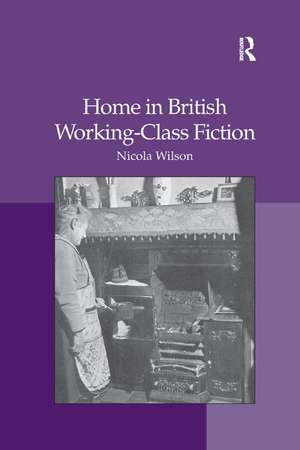Home in British Working-Class Fiction
Autor Nicola Wilsonen Limba Engleză Paperback – 21 mai 2019
| Toate formatele și edițiile | Preț | Express |
|---|---|---|
| Paperback (1) | 256.32 lei 6-8 săpt. | |
| Taylor & Francis – 21 mai 2019 | 256.32 lei 6-8 săpt. | |
| Hardback (1) | 766.57 lei 6-8 săpt. | |
| Taylor & Francis – 30 apr 2015 | 766.57 lei 6-8 săpt. |
Preț: 256.32 lei
Preț vechi: 324.58 lei
-21% Nou
Puncte Express: 384
Preț estimativ în valută:
49.05€ • 53.26$ • 41.20£
49.05€ • 53.26$ • 41.20£
Carte tipărită la comandă
Livrare economică 23 aprilie-07 mai
Preluare comenzi: 021 569.72.76
Specificații
ISBN-13: 9780367346546
ISBN-10: 0367346540
Pagini: 252
Dimensiuni: 156 x 234 x 16 mm
Greutate: 0.27 kg
Ediția:1
Editura: Taylor & Francis
Colecția Routledge
Locul publicării:Oxford, United Kingdom
ISBN-10: 0367346540
Pagini: 252
Dimensiuni: 156 x 234 x 16 mm
Greutate: 0.27 kg
Ediția:1
Editura: Taylor & Francis
Colecția Routledge
Locul publicării:Oxford, United Kingdom
Notă biografică
Nicola Wilson is a British Academy Postdoctoral Research Fellow at the University of Reading, UK.
Recenzii
'Striking the right balance between social context, history and close reading, Wilson brings to life the work of authors who are still not read as much as they should be. Her book provides a fine account of "home" and the many ways in which it was observed and criticised from the early years of the twentieth century through to its close.' Andrzej Gasiorek, University of Birmingham, UK
"an ambitious and welcome addition to the few studies about the working class by the working class, which changes it from subject to experience"
"draws on an impressive range of sources to argue that there has been a tendency to ignore the importance of ideas and meanings of home as a key part of working-class writing"
- Belinda Webb-Blofeld, The TLS
"Home in British Working-Class Fiction fills an important niche; Wilson notes at the outset that due to gender biases and the attention to paid work outside the home, most prior studies of working-class texts do not attend at any length to domestic space itself. Recognising the importance of analyses of domestic space pioneered by such scholars as Nancy Armstrong, whom she discusses, Wilson connects the novels she explores to such readings of gender and material culture, engaging as well and at length with scholars of working-class novels. The mentions of lived experiences and structures of feeling anchor the book in the tradition of Raymond Williams, as does her broad contextualisation of texts and techniques in the larger span of literary history. Wilson also engages with seminal studies by such commentators as Ian Haywood, Pamela Fox and John Kirk. Home in British Working-Class Fictiondoes vital work in establishing an alternative narrative about working-class fiction that builds upon these scholars, but it also broadens their scope to include additional texts and more comprehensive readings of domestic space and gender in the texts they do analyse. In doing so, Wilson makes the case for the ongoing relevance of class as a conceptual category in the analysis of British fiction."
- Mary McGlynn, Literature & History
"an ambitious and welcome addition to the few studies about the working class by the working class, which changes it from subject to experience"
"draws on an impressive range of sources to argue that there has been a tendency to ignore the importance of ideas and meanings of home as a key part of working-class writing"
- Belinda Webb-Blofeld, The TLS
"Home in British Working-Class Fiction fills an important niche; Wilson notes at the outset that due to gender biases and the attention to paid work outside the home, most prior studies of working-class texts do not attend at any length to domestic space itself. Recognising the importance of analyses of domestic space pioneered by such scholars as Nancy Armstrong, whom she discusses, Wilson connects the novels she explores to such readings of gender and material culture, engaging as well and at length with scholars of working-class novels. The mentions of lived experiences and structures of feeling anchor the book in the tradition of Raymond Williams, as does her broad contextualisation of texts and techniques in the larger span of literary history. Wilson also engages with seminal studies by such commentators as Ian Haywood, Pamela Fox and John Kirk. Home in British Working-Class Fictiondoes vital work in establishing an alternative narrative about working-class fiction that builds upon these scholars, but it also broadens their scope to include additional texts and more comprehensive readings of domestic space and gender in the texts they do analyse. In doing so, Wilson makes the case for the ongoing relevance of class as a conceptual category in the analysis of British fiction."
- Mary McGlynn, Literature & History
Cuprins
Introduction; Chapter 1 Writing Home and Class; Chapter 2 The Forefathers of the Working-Class Novel; Chapter 3 Working Women and the Little House; Chapter 4 Home on the Dole in the Hungry Thirties; Chapter 5 Anger, Affluence and Domesticity; Chapter 6 The Uprooted and the Anxious; Chapter 7 Estates and the New Slum Life; Chapter 101 Afterword;
Descriere
Examining key works by Robert Tressell, Alan Sillitoe, D.H. Lawrence, Buchi Emecheta, Pat Barker, Jeanette Winterson and James Kelman, among many others, Nicola Wilson demonstrates the importance of home's role in the making and expression of class feeling and identity.
